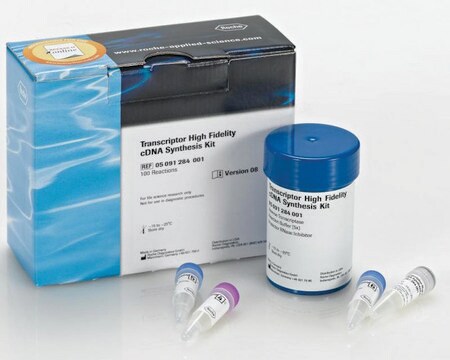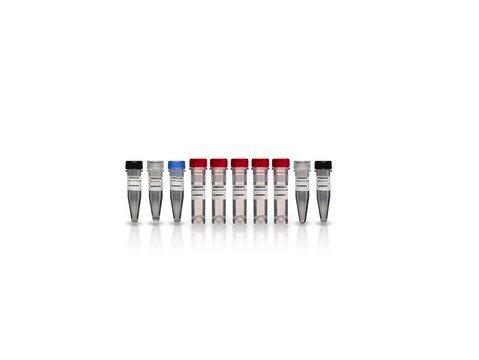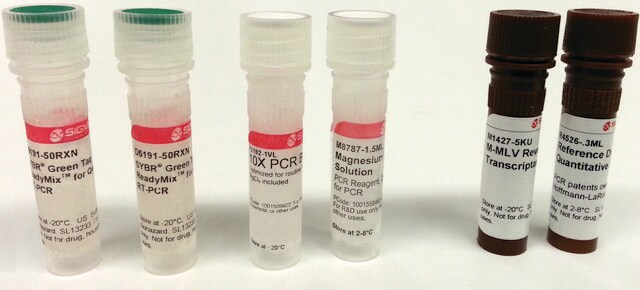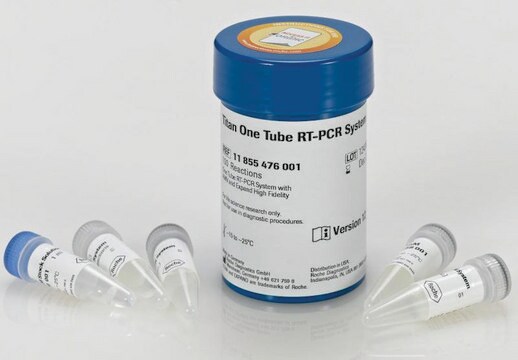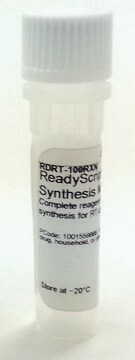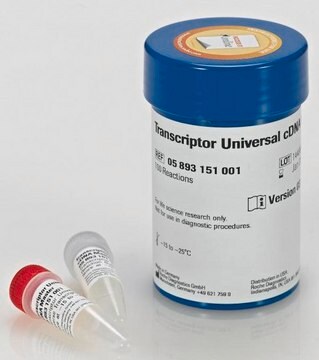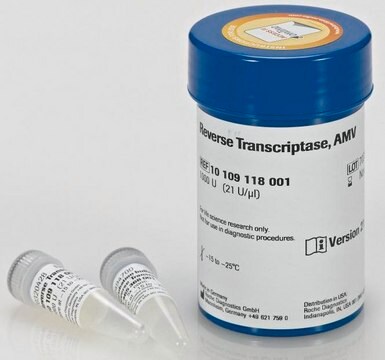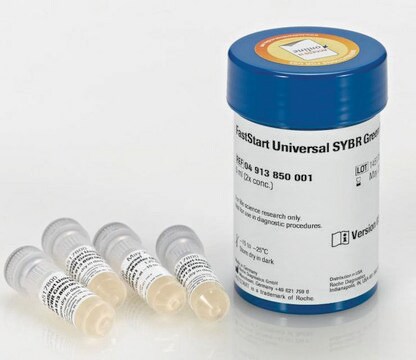11483188001
Roche
First Strand cDNA Synthesis Kit for RT-PCR (AMV)
sufficient for 30 reactions (including 5 control reactions), kit of 1 (10 components), suitable for RT-PCR, hotstart: no, dNTPs included
Sinônimo(s):
RT-PCR, cDNA sysnthesis
About This Item
Produtos recomendados
uso
sufficient for 30 reactions (including 5 control reactions)
Nível de qualidade
atividade específica
>50 units/μg protein
Características
dNTPs included
hotstart: no
embalagem
kit of 1 (10 components)
fabricante/nome comercial
Roche
Parâmetros
42 °C optimum reaction temp.
técnica(s)
RT-PCR: suitable
entrada
purified RNA
temperatura de armazenamento
−20°C
Categorias relacionadas
Descrição geral
AMV RT synthesizes the new cDNA strand at site(s) determined by the type of the primer used:
- at the 3′-end of the poly(A) mRNA when Oligo-p(dT)15is used as a primer,
- at nonspecific points along the mRNA template when using the random primer p(dN)6, or
- at a site determined by a sequence-specific primer.
Especificidade
Reverse Transcriptase AMV
Aplicação
- Detection of the presence or absence of RNA viruses or other RNA-containing microorganisms (in combination with PCR)
- Quantification of mRNA for monitoring differential expression of a specific mRNA
- First step in the "differential display of mRNA"
- Generation of cDNA libraries with large and full-length inserts
- Reverse transcription-quantitative polymerase chain reaction (RT-qPCR) for reverse transcription of RNA into complementary DNA.
Características e benefícios
- Transcribes total RNA, mRNA and viral RNA along with difficult-to-transcribe secondary RNA structures
- Obtain cDNA transcripts up to 12 kb
- Higher thermostability (up to 50°C) and specificity than M-MuLV Reverse Transcriptase
- Purification of the resulting cDNA before PCR reaction is not necessary
It can be used with either sequence-specific primers, poly(dT)15 primers, or random primers, p(dN)6
Embalagem
Qualidade
Definição da unidade
Outras notas
Somente componentes do kit
- Reverse Transcriptase AMV
- PCR Nucleotide Mix, pH 8.5 10 mM each
- Reaction Buffer
- MgCl2 Stock Solution 25 mM
- Gelatin 0.05% (w/v)
- Oligo-p(dT)15 , 0.02 A260 units/μl 0.8 μg/μl
- Random Primer p(dN)6 , 0.04 A260 units/μl 1.6 μg/μl
- RNase Inhibitor 50 U/μl
- Control Neo pa RNA (1.0 kb in length with additional 19-base 3′-poly(A) tail) 0.2 μg/μl
- Water, PCR Grade
Código de classe de armazenamento
12 - Non Combustible Liquids
Classe de risco de água (WGK)
WGK 1
Ponto de fulgor (°F)
does not flash
Ponto de fulgor (°C)
does not flash
Escolha uma das versões mais recentes:
Já possui este produto?
Encontre a documentação dos produtos que você adquiriu recentemente na biblioteca de documentos.
Os clientes também visualizaram
Biosynthetic Genes lovE and lovF
Protocolos
First Strand cDNA Synthesis Kit for RT-PCR (AMV) Protocol
Conteúdo relacionado
RT-qPCR, or quantitative reverse transcription PCR, combines the effects of reverse transcription and quantitative PCR or real-time PCR to amplify and detect specific targets. RT-qPCR has a variety of applications including quantifying gene expression levels, validating RNA interference (RNAi), and detecting pathogens such as viruses.
Nossa equipe de cientistas tem experiência em todas as áreas de pesquisa, incluindo Life Sciences, ciência de materiais, síntese química, cromatografia, química analítica e muitas outras.
Entre em contato com a assistência técnica
